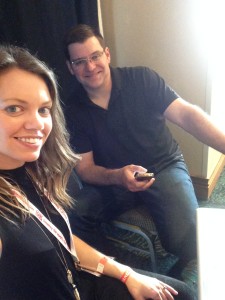This week, I got to travel to Florida to speak at the RPM Promoter’s Workshops. My presentation was on social media, and how tracks can use Facebook in particular to succeed in promoting their events.

Prepping for my speech with Carl Bowser at RPM Daytona.
It was fun to get to talk to a lot of tracks who were more interested and active on social media than even a year ago, and hear about their insights. And some promoters even got up and shared the results they’d gotten based on my training or advice with the nearly two hundred other promoters in the room, which meant more to me than any of them know.
Social media was definitely hotter topic than last year, and there was one topic that was particularly popular among those who are still unsure about social media’s place in the sport or are outraged by what some tracks are doing. They came to me through two questions:
- What do you think of the controversial ‘social media policies’ that some tracks are adopting, banning or fining those who share negative opinions about the track on social media?
- What do you think of industry members – fans, teams, media and tracks – who criticize the sport on social media?
I loved taking part in these discussions – mostly because they were asking the questions in the first place. Most of those asking knew that social media was a powerful tool, had heard the arguments of those who fear the effects of social media and were open to a discussion on the opposing side, which was very exciting to me.
Some were even looking for tips on what to say to their peers who supported those policies or anti-social-media sentiments.
Here what I shared with them: I fear for any sport (or industry, government or group of people) that ‘bans’ negative feedback.
It tells customers, and potential future customers, that we don’t care what they think. That we’re not open to improving. That if they want to give us their money, that’s fine, but they’re going to take what we give them in exchange for it and like it. Or don’t come back.
Or, if you dare to complain about it, you won’t even be allowed to come back even if you wanted to. Which seems unlikely at this point.
When things don’t go right, whether it’s in your control or not, paying customers have the right to be unsatisfied with that experience.
I understand that you probably worked hard to provide them with the experience that they had, and it can be frustrating that wasn’t received well. What we have to understand is that they also worked hard for the money they shelled out to be a part of your event, whether they’re a ticket holder or a racer.
(Note – racers are customers, too. You’re paying them to put on a show, but you’re not their ’employer’ when the amount of money they have to spend to do their ‘job’ far outweighs what you pay them directly. Mind you: I think that’s okay – that’s how the ecosystem works. Tracks generally provide the venue and marketing partners, team owners and drivers generally pay the bills. Those people are who racers answer to. More thoughts about that purse/cost gap can be found here.)
When we accept money for a product or service, we then owe our customers a level of accountability. Open dialogue – social media and otherwise – allows for that.
What keeps us coming back as customers even after a bad experience at a store, restaurant or race track is the feeling that it was a one-off problem and we can expect better next time. If we don’t allow negative feedback, customers won’t believe they can expect anything but more of the same in the future. And they won’t come back. And they definitely will discourage others from making the same mistake they did.
I agree that ‘bashing’ on social media isn’t good for the sport. But there’s a huge difference between ‘bashing’ and constructive criticism.
There will always be people who bash – with or without any sense of reason. You can’t escape that. But if you’re building an open line of communication with your fans, you’ll find that even when you make mistakes, you’ll have more supporters standing up for you than customers turned away by a basher’s sentiments.
The most powerful form of marketing is word of mouth.
I think that’s what scares fearful promoters most about social media – they can’t control what the public is seeing, unless they create a policy.
But an open door builds community. It builds loyalty and support. It builds a fan base.
Sure it can force us to take a good, hard look at our endeavors at times. But might that be exactly what we need?
Without constructive feedback and improvements that reflects what our customers want, your business risks dying a (silent) death. I don’t know about you, but I’d rather have a chance to improve and grow into something better than I even imagined (that’s what customer feedback can do for you!) than be right and out of business.
xo.
Kristin

